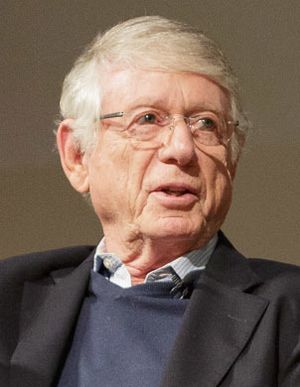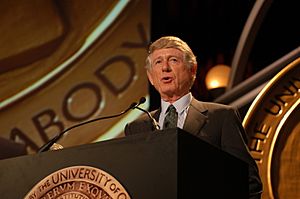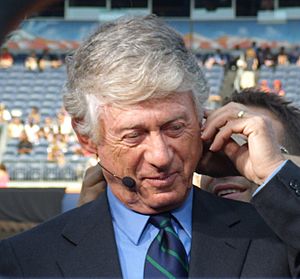Ted Koppel facts for kids
Quick facts for kids
Ted Koppel
|
|
|---|---|

Koppel in December 2017
|
|
| Born |
Edward James Martin Koppel
February 8, 1940 Nelson, Lancashire, England
|
| Education | Syracuse University (BS) Stanford University (MA) |
| Occupation | |
| Years active | 1963–present |
| Known for | Nightline (1980–2005) |
| Spouse(s) |
Grace Anne Dorney
(m. 1963) |
| Children | 4, including Andrea |
Edward James Martin Koppel (born February 8, 1940) is a famous American journalist. He is best known for being the main anchor of the TV show Nightline. He hosted Nightline from when it started in 1980 until 2005.
Before Nightline, Ted Koppel worked for 20 years at ABC as a journalist and news anchor. After he became the host of Nightline, many people saw him as one of the best interviewers on American television. Five years after it began, the show had about 7.5 million viewers every night.
After leaving Nightline, Koppel worked for the Discovery Channel. He was also a news analyst for NPR and BBC World News America. He contributed to other shows too. Since 2016, Koppel has been a Senior Contributor to CBS News Sunday Morning. He has won many awards for his work as a foreign and diplomatic reporter. These include nine Overseas Press Club awards and 43 Emmy Awards.
Contents
Early Life and Education
Ted Koppel's Childhood in England
Edward James Martin Koppel was born in Nelson, England. He was an only child. His parents were German Jews who left Germany because of Adolf Hitler and Nazism. In Germany, Koppel's father owned a company that made tires. To help the British economy, the government invited his parents to move their factory to Lancashire, England. They were promised protection if a war started.
The factory moved in 1936. But when World War II began in 1939, Koppel's father was seen as a foreigner from a country at war. He was held on the Isle of Man for about a year. Ted Koppel was born in 1940, shortly after his father was taken away. To care for her baby, his mother sold her jewelry and did small jobs in London. After his father was released, he was not allowed to work in England.
Moving to the United States
After the war ended, the family got some money from their belongings. They decided to move to the United States. While in England, Ted Koppel went to Abbotsholme School. In 1953, when he was 13, his family moved to the U.S. His mother, Alice, became a singer and pianist. His father, Edwin, opened a tire factory. Koppel's childhood hero was a radio reporter named Edward R. Murrow. Murrow's reports during the bombing of London inspired Koppel to become a journalist.
College Years
After attending McBurney School in New York, Koppel went to Syracuse University. He graduated at age 20 with a Bachelor of Science degree. He was part of the Pi Kappa Alpha fraternity. A roommate remembered that Koppel was "incredibly focused" and had a "photographic memory."
Koppel then went to Stanford University. There, he earned a Master of Arts degree in mass communications and political science. While at Stanford, he met his future wife, Grace Anne Dorney.
Ted Koppel's Journalism Career
Starting Out in News
Koppel briefly worked as a teacher. Then he was hired as a copyboy at The New York Times. He also worked as a writer at WMCA Radio in New York. In June 1963, he became the youngest reporter ever hired by ABC Radio News. He worked on the Flair Reports program. His reporting on the Kennedy assassination in 1963 helped him get noticed. He was supposed to give a short report, but a delay made him speak without a script for an hour and a half.
In 1964, he covered his first of many presidential conventions. He also started covering the civil rights movement in Selma, Alabama. ABC leaders were impressed by Koppel's ability to explain things clearly. In 1966, he became the ABC News reporter for the Vietnam War. He moved from radio to national television. He agreed to go only if ABC sent his wife and two children to Hong Kong so they could be close by. Before going, he learned the Vietnamese language.
Reporting from Around the World
He returned in 1968 to cover Richard Nixon's presidential campaign. Then he became the Hong Kong bureau chief. He also became the U.S. State Department reporter. There, Koppel became friends with Henry Kissinger.
Koppel was among the journalists who traveled to China with U.S. President Richard Nixon in 1972. He talked about this trip in a documentary series. Koppel described the trip as a "journey to the dark side of the moon." By 1975, he was anchoring the ABC Evening News on Saturdays. He also continued to report for ABC Radio.
Koppel often reported on foreign conferences with the State Department. For example, he traveled with Kissinger during meetings in Egypt and Israel in 1975. He said about Kissinger: "I have a high regard for Henry. He has a first-class mind."
In the mid-1970s, Koppel took a year off from his career. He stayed home with his children so his wife could finish her education at Georgetown Law School. This decision upset ABC News president Roone Arledge. When Koppel returned, he was no longer a news anchor.
In April 1979, he was the lead reporter for a series called "Second to None?". This series explained the dangers of nuclear war. He did his own research and wanted to present "complex material to an audience that hasn't paid much attention." He won an Alfred I. duPont–Columbia University Award for this series.
Hosting Nightline
In 1980, Koppel became very well known as the host of a late-night news show called Nightline. The show started as special reports about the Iran hostage crisis. During this crisis, Iranian militants held 52 Americans captive for 444 days. At first, the show was called The Iran Crisis: America Held Hostage. Frank Reynolds was the host. Koppel later joined Reynolds as a co-anchor. In March 1980, the program became Nightline, with Koppel as its main host. Koppel hosted the show for 25 years. He left ABC and Nightline in November 2005.
While hosting Nightline, Koppel also hosted special programs called Viewpoint. These shows, starting in 1981, looked at how the media reported news. They allowed viewers to ask questions about news stories or critique TV news. Viewpoint was shown sometimes from 1981 until 1997.
Some groups thought Koppel favored the government's point of view. They accused him of choosing mostly conservative guests. Koppel replied that "We are governed by the president and his cabinet... And they are the ones who are responsible for our foreign policy, and they are the ones I want to talk to."
In 1990, Koppel interviewed Nelson Mandela in a special town hall meeting. Also in 1990, ABC News aired a special called "The Best of Nightline with Ted Koppel."
On November 22, 2005, Koppel left Nightline after 25 years. He also left ABC after 42 years. His final Nightline show did not feature clips of his famous interviews. Instead, it replayed an episode from 1995. This episode showed Koppel's interviews with a professor named Morrie Schwartz, who was dying.
On March 24, 2020, Koppel made a guest appearance on Nightline for its 40th anniversary. He talked about how he and his wife were dealing with the COVID-19 pandemic.
After ABC: New Roles in News
After leaving Nightline, Ted Koppel took on many different roles in news:
- He started writing opinion pieces for The New York Times in January 2006.
- He partnered with Discovery Communications for three years. He was the managing editor of the Discovery Channel. While there, Koppel made several long documentaries. One was a four-hour series in 2008 about China. Koppel said this was some of the work he was "most proud of." The documentary, called The People's Republic of Capitalism, explored how China was changing quickly. It looked at Chinese consumers in the growing economy. Koppel and Discovery Communications ended their partnership early in November 2008.
- Starting in June 2006, he provided commentary for shows on National Public Radio (NPR). He joined NPR's other Senior News Analysts. He also participated in the annual NPR Fourth of July reading of the Declaration of Independence in 2007. Koppel stopped his regular commentary on NPR in April 2008. He last appeared as a news analyst there in 2014.
- Koppel made occasional guest appearances on The Daily Show. He appeared as a large, disembodied head, acting as Jon Stewart's journalistic conscience.
- Koppel worked for BBC World News America as a "contributing analyst." He covered the 2008 Republican and Democratic National Conventions. He also hosted a special edition of the program in 2011.
- On December 12, 2011, Koppel first appeared on NBC Nightly News with Brian Williams as a reporter. He later became a special correspondent for NBC's Rock Center until the show ended.
- On August 6, 2013, The Wall Street Journal published an opinion piece by Koppel. It was titled "America's Chronic Overreaction to Terrorism."
- In 2015, Koppel published a book called Lights Out: A Cyberattack, A Nation Unprepared, Surviving the Aftermath. The book is about the possibility of a major cyber-attack on America's power grid.
- Since March 2016, Koppel has been a special contributor to CBS News Sunday Morning.
Awards and Recognition
Ted Koppel has received many honors and awards for his work:
- Eight Alfred I. duPont–Columbia University Awards for broadcast journalism.
- Nine Overseas Press Club Awards for best television commentary on foreign news.
- Two George Polk Awards.
- Two Sigma Delta Chi Awards.
- Three George Foster Peabody Awards.
- 1987: An honorary Doctor of Humane Letters degree from Duke University.
- 2004: Paul White Award from the Radio Television Digital News Association.
- 2006: An honorary Doctor of Laws degree from the University of Southern California.
Koppel often returns to Syracuse University as a guest speaker. He was a member of the student radio station WAER. He stays in touch with student media at Syracuse. He is also a member of the Pi Kappa Alpha fraternity.
Emmy Awards
He has won 25 Emmy Awards, including:
- 1987 - Outstanding Coverage of a Breaking News Story - Programs (Nightline)
- 1999 - Outstanding Investigative Journalism - Programs (Nightline)
- 1999 - Outstanding Coverage of a Breaking News Story - Programs (Nightline)
- 2004 - Outstanding Feature Story in a News Magazine (Nightline)
- 2007 - Lifetime Achievement Award
Personal Life
Ted Koppel is married to Grace Anne (née Dorney). He became a naturalized citizen of the United States in 1963. They have four children: Andrea (who was also a journalist), Deirdre, Andrew, and Tara.
Koppel speaks German and French, in addition to English.
A longtime friend of Koppel's was former Secretary of State Henry Kissinger. Both of them moved to the United States as children. Along with former Secretary of State Alexander Haig, Kissinger was the most frequent guest on Nightline. In a 1989 interview, Koppel said, "Henry Kissinger is, plain and simply, the best secretary of state we have had in 20, maybe 30 years." He added, "I’m proud to be a friend of Henry Kissinger. He is an extraordinary man."
In 1993, Koppel and his wife bought 16 acres of land overlooking the Potomac River in Potomac, Maryland.
See also
- Koppel on Discovery: Iran, The most Dangerous Nation?
 | Leon Lynch |
 | Milton P. Webster |
 | Ferdinand Smith |



